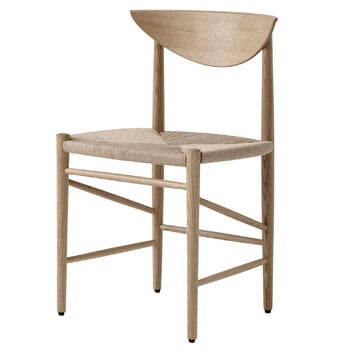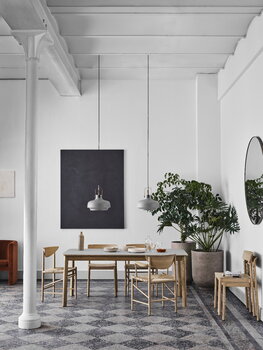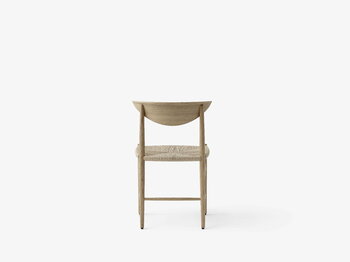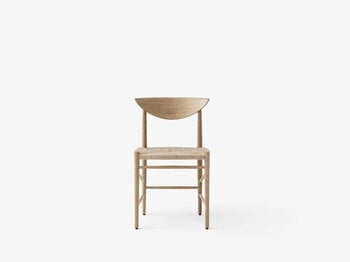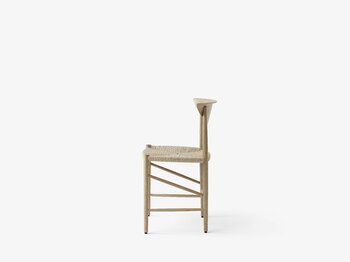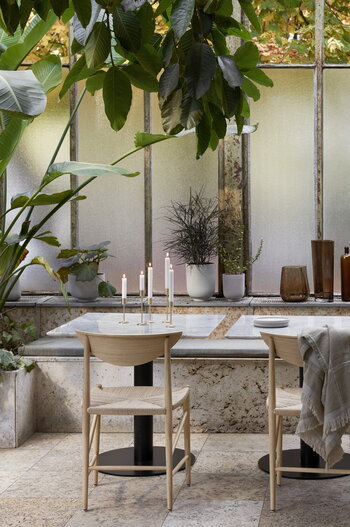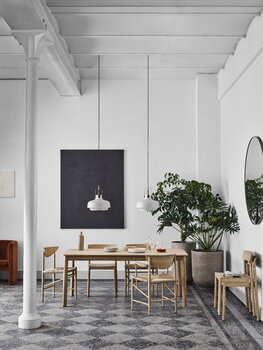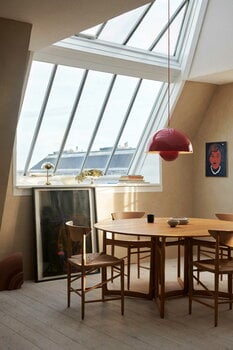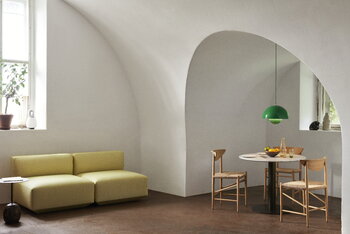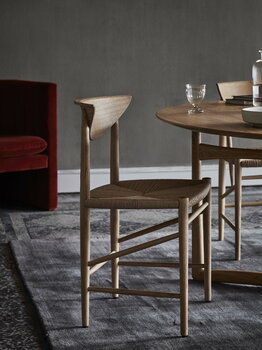&Tradition’s Drawn chair is a beautiful piece of Danish mid-century design. Crafted from solid wood with a charming hand-woven paper cord seat, the chair is characterised by its crescent-shaped backrest and diagonally placed braces. Natural materials and traditional techniques lend the chair an honest, unassuming air that makes Drawn easily fit into both modern and more classic interiors. The Drawn chair was designed by Hvidt & Mølgaard in 1956.
Drawn HM3 chair, white oiled oak
&Tradition
Description
&Tradition’s Drawn chair is a beautiful piece of Danish mid-century design. Crafted from solid wood with a charming hand-woven paper cord seat, the chair is characterised by its crescent-shaped backrest and diagonally placed braces. Natural materials and traditional techniques lend the chair an honest, unassuming air that makes Drawn easily fit into both modern and more classic interiors. The Drawn chair was designed by Hvidt & Mølgaard in 1956.
Product details (9)
- Colour
- White oiled oak
- Width
- 49 cm
- Depth
- 46 cm
- Height
- 78 cm
- Seat height
- 46 cm
- Material
- Solid wood, formpressed wood veneer
- Seat material
- Paper cord
- Weight
- 4.4 kg
- Notes
- Wagner Quick-click felt gliders with interchangeable plastic inserts installed as standard.
- Product ID
Designer
Design duo Hvidt & Mølgaard, formed by Peter Hvidt (1916–1986) and Orla Mølgaard-Nielsen (1907–1993), was a pioneer of Danish mid-century design. The Copenhagen-based studio Hvidt & Mølgaard became famous for numerous refined furniture designs that are now known as icons of their era. Hvidt & Mølgaard’s designs combine a respect for traditional crafting methods with a forward-thinking approach to modern techniques and mass-production. Today, their work is exhibited in numerous museums, including New York’s MoMA and Melbourne’s National Gallery.
View all productsReviews (1)
5
Based on 1 reviews
-
K
Kathryn H
Australia
Love my dining chairs Colour is perfect, very comfortable
315 days ago
Sustainability
The Product Sustainability Framework, our criteria of sustainable design, helps you find the most sustainable products in our selection. Read below which sustainability criteria this product has met.
Working conditions & labour 8/9
-
Equal opportunities for all employees
-
Commitment to UN Global Compact, fair compensation for all employees
-
Corporate responsibility requirements defined and communicated for suppliers
-
Systematic work for improved inclusion and well-being in the workplace
-
Transparent supply chain
-
Suppliers' compliance to a code of conduct ensured
-
Direct suppliers audited and certified
-
Compliance to the UN Guiding Principles on Business and Human Rights ensured in the supply chain
-
Support for community involvement in the supply chain
Eco-friendly production 6/9
-
Fair and resource-wise water-use in production
-
No incineration or landfilling of returned items
-
No use of endangered species as materials
-
No direct environmental emissions or waste (excl. GHGs) from production
-
Material-efficient and ecological packaging
-
No potentially harmful chemicals used in own production
-
The sustainability of direct suppliers' production is addressed and monitored
-
Production and material sourcing that respect biodiversity, animal rights, and natural ecosystems
-
Positive impact on nature’s well-being through operations that regenerate natural ecosystems
Climate impact 5/8
-
Company's direct greenhouse gas emissions identified and commitment to reduction
-
Product's carbon impact identified and commitment to reduction
-
Guidance on energy- and eco-efficient use of the product
-
Contribution to climate initiatives beyond the brand’s direct operations
-
100 % renewable energy in own production and operations
-
Low-carbon or compensated transportation
-
Carbon footprint of the product calculated and goals set to reduce it
-
Carbon neutral or carbon negative product
Sustainable materials 4/6
-
Sustainable and long-lasting material choices
-
No harmful or hazardous substances
-
Responsible raw material sourcing and production
-
Ecological materials: natural, biodegradable, recyclable or recycled contents
-
Materials suited for circularity: monomaterials, recyclable finishings, renewable or recycled contents etc.
-
Outstanding materials in terms of innovativeness, responsibility, sustainability and circularity: local production or sourcing, 100 % recycled content, C2C-certification etc.
Circular design 4/5
-
High aesthetic quality promoting long-term use of the product
-
Technically durable product design and material choices
-
Design for enduring life-long quality
-
Design and support for product maintenance, repair and upgradability
-
Innovative circular design solutions: circular service system, resale platform, remanufacturing, collection of used products, etc.
